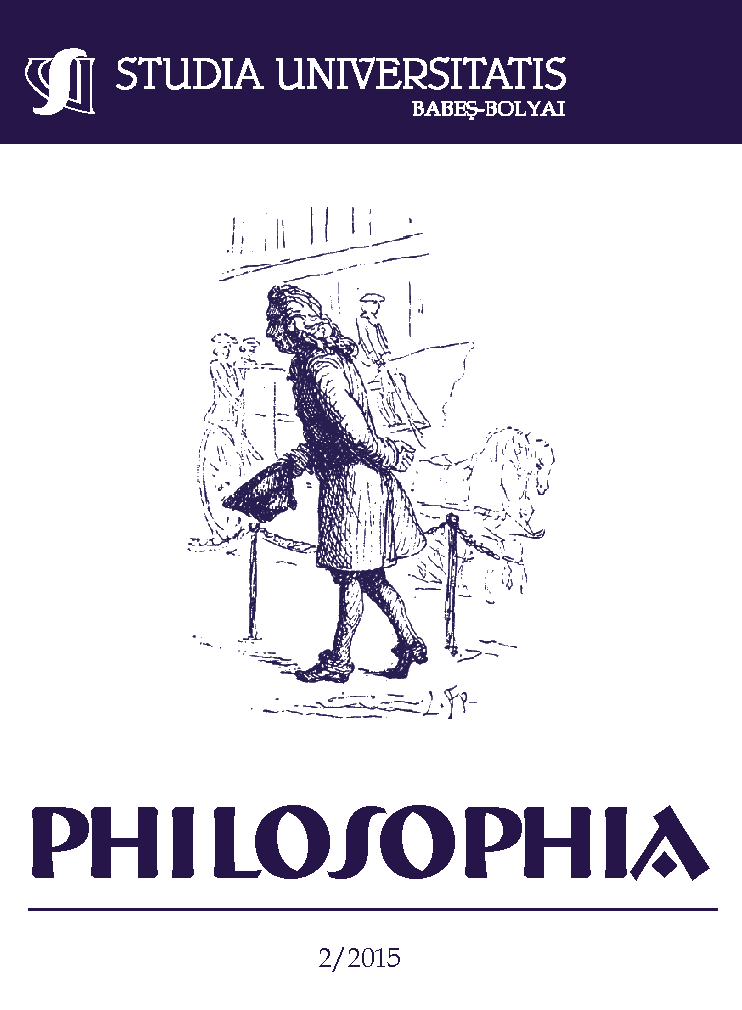LES EXCENTRICITÉS DE LA RAISON - ESSAI SUR LE GORGIAS -
Keywords:
ethical concepts, dialogue, doxa, episteme, question, argumentationAbstract
The Eccentricities of Reason - Essay on the Gorgias. The figure of Socrates, as it appears in Plato’s dialogues, is that of a singular, original character, an eccentric one in the environment of the Athenian polis. The eccentricity of the philosopher is also arguable from a spatial point of view, against the attribute of heterotopy - Socrates enters the stage more often than not from the outside, that is from an ex-centric place or at any rate marginal in relation to the centre (the house of a main character or the palaestra, the favourite place of the Sophists), but also particularly in terms of a discourse. In fact, Socrates passes for the partisan of an eccentric logic, which is that of the paradox, off-center from the doxa: the totality of what is commonly accepted. If Socrates deliberately chooses paradoxical formulation, this is because in his view, the latter are invested with a non-negligible epistemic role. Hence, with Socrates, the paradox is a formidable instrument of knowledge. One of the main themes of the Gorgias being precisely the knowledge of ethical concepts (what is just and unjust, good and bad, what is happiness?) - can argumentative semantics (Anscombre & Ducrot 1983, Ducrot & Carel 1999) offer a standard for the pertinent reading of these concepts? The paradox of Socrates is equally being the master who questions and teaches at the same time. Therefore, what is the role of questioning in the economy of the dialogue? Given that, Socrates and his interlocutors each believe something. Do these beliefs reveal the episteme or the doxa? The question is not a trivial one, since it opposes two different ethical profiles: the philosopher and the sophist.
References
Anscombe, Gertrude Elizabeth Margaret, L’Intention, Paris, Gallimard, 2002.
Anscombre, Jean-Claude, DUCROT, Oswald, L’Argumentation dans la langue, Bruxelles, Mardaga, 1983.
Aristote, Premiers Analytiques, chap. XXVII. Paris, Ladrange, 1866 [Consulté en édition numérique à l’adresse http://docteurangelique.free.fr]
Brugère, Fabienne, « À quoi sert le savoir ? La réponse de Fabienne Brugère », in À quoi sert le savoir ?, Paris, PUF, 2011.
Cometti, Jean-Pierre, Qu’est-ce qu’une règle ?, Paris, Vrin, 2011.
Cornea, Andrei, Când Socrate nu are dreptate, Bucureşti, Humanitas, 2005.
Darriulat, Jacques, Introduction à la philosophie de Platon. Les maîtres de sagesse [Consulté en édition numérique à l’adresse http://www.jdarriulat.net/Auteurs/Platon/Introduction/PlatonIntrod1.html#Text4].
Ducrot, Oswald, « Note sur l’argumentation et l’acte d’argumenter », Cahiers de linguistique française, n° 4/1982.
Ducrot, Oswald, « Les topoï dans la théorie de l’argumentation dans la langue », in Christian Plantin (éd.), Lieux communs, topoï, stéréotypes, clichés, Paris, Kimé, 1993.
Ducrot, Oswald, Carel, Marion, « Le problème du paradoxe dans une sémantique argumentative », Langue Française, n° 123/1999.
Grimaldi, Nicolas, Socrate le sorcier, Paris, PUF, 2004.
Lacroix, Jean-Yves, L’utopia de Thomas More et la tradition platonicienne, Paris, Vrin, 2007.
Păunescu, Marina-Oltea, « Ethos sophistique vs ethos socratique : deux scénarios pédagogiques, Studii şi cercetări lingvistice, n° 2/2009.
Quine, Willard van Orman, Du point de vue logique. Neuf essais logico-philosophiques, Paris, Vrin, 2003.
Vlastos, Gregory, Socrate: ironist si filozof moral, Bucureşti, Humanitas, 2002.
Williams, Bernard, L’éthique et les limites de la philosophie, Paris, Gallimard, 1990.
Downloads
Published
How to Cite
Issue
Section
License
Copyright (c) 2015 Studia Universitatis Babeș-Bolyai Philosophia

This work is licensed under a Creative Commons Attribution-NonCommercial-NoDerivatives 4.0 International License.





